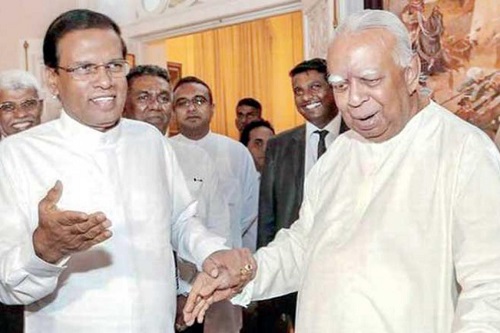AFP photo
By
Malinda Seneviratne
What’s the worst thing this Government has done? Well, one could make a long list and shake it many times. One could do a compare-and-contrast exercise with the first three years of previous regimes going back to Independence and play that familiar game of suppressing the bad, inflating the good and so on. It would be hard to deny however that however long the list is and whatever it may contain, among the worst things this Government has done is to turn ‘Good Governance’ into a cuss word.
How Yahapalanaya became a bad word would be an excellent thesis topic for a political science undergraduate in any university. That unwritten thesis is known. The results of the recently concluded local government election proves it. The verdict was clear: ‘not only are you people not serious about good governance, you are also utterly incompetent.’ It was a vote of no confidence if ever there was one.
The incompetence, nepotism, corruption, abuse of state resources and buttressing of the system of political patronage is all too evident. It has come to a point where it is utterly hilarious when diehard loyalists defend the regime.
Some talk about the dark days of the previous regime, as though they don’t know that many in this government were part of that regime or that some were part of regimes as bad or worse. It is also funny when some of those who take issue with the way things were before January 2015 were quite supportive of Velupillai Prabhakaran and even wanted to let him and his bunch of terrorists rule one third of the island and control two thirds of the coastline.
It is funny when they take umbrage at certain ministers supporting the vote of no confidence against the Prime Minister and invoke the notion of collective responsibility when the entire cabinet by omission or commission is guilty of criminal irresponsibility on multiple counts.
They could put it all down to ‘political culture’ and the lack of human resources, but they would be hard pressed to deny that it was deliberate, irresponsible and pernicious to script a clause into the 19th Amendment to get around the limit to cabinet size promised in the manifesto and preambled in the amendment itself. All illusions about good governance from this lot died that day. Some however are in denial, naturally.
Let’s consider the business of the Opposition Leader. ‘Business’ not in the sense of his/her responsibilities but the post itself.
It was strange when Nimal Siripala Silva was made Opposition Leader because he was a member of the Sri Lanka Freedom Party (SLFP) which was officially part of the Government. It was less strange when R Sampanthan was made Opposition because the Tamil National Alliance (TNA) had the most number of MPs outside of the parties that made the Government. It is strange that he remained the Leader of the Opposition after some 50 MPs of the SLFP decided and made it known to the Speaker they are not part of the Government and would function as a separate group in the Opposition. Sampanthan’s position looks even more politically grotesque considering that he has sided with the Government on a key no-confidence motion. That the Speaker, in all his wisdom, appears to be absolutely ignorant about parliamentary arithmetic and political realities, especially considering the fact that parliamentary composition is at odds with general voter sentiment, is itself strange.
If any proof was necessary that this Government has no clue about ‘good governance’ or ‘democracy’ and probably never really cared about either, we need look no further than the recent response of Cabinet Spokesman Rajitha Senaratne to a question posed to him regarding the post of Opposition Leader. This was the question: ‘If the UNP forms a government on its own, shouldn’t the post of Opposition Leader go to the SLFP?’
First of all, whether or not the UNP can form a government on its own is a moot point, given that the President is not from that party but would be a part of the Government and thereby fulfil the ‘National Government Escape Clause to Inflate the Cabinet’. Senaratne did not mention any of that. He completely ignored basic arithmetic. One might say he dodged the question.
He simply said that it’s good to have a Tamil as Opposition Leader. He then compared apples with oranges, talking about J.R. Jayewardene removing A. Amirthalingam as the Leader of the Opposition. J.R. Jayewardene did a lot of cunning things. He orchestrated the removal of Amirthalingam through the 6th Amendment to the Constitution (J.R. Jayewardene was a UNPer, by the way, a fact that Senaratne might have forgotten). J.R. Jayewardene was not, however, arithmetically challenged the way Senaratne obviously is.
Senaratne went on to say ‘as a result Prabhakaran became the Leader of the Opposition.’ Clever twist, but still dodgy, for Prabhakaran was not a product of a single piece of political manipulation.
In any event, short-sighted legislators (of all parties, including those in the Joint Opposition) gave us a constitutional bind that prevents the correction of the representational anomaly that the February 10th election revealed. That said, there’s nothing to prevent the correction of the obvious travesty of the group that has the most numbers among the parties in the Opposition from having the right to select the Opposition Leader.
It is convenient for Senaratne and others to dodge the issue and talk political nonsense. In fact one might even say that Senaratne, in this, is the ideal spokesperson for this cabinet. However, those who swore and swear on good governance and democracy need to rethink or shut up, for silence on this is telling.
Malinda Seneviratne
I am a journalist, political commentator and a chess enthusiast. I was educated at the University of Peradeniya, Harvard University, University of Southern California and Cornell University and live in and work from Kottawa, Sri Lanka.



No Comments Yet!
You can be first to comment this post!